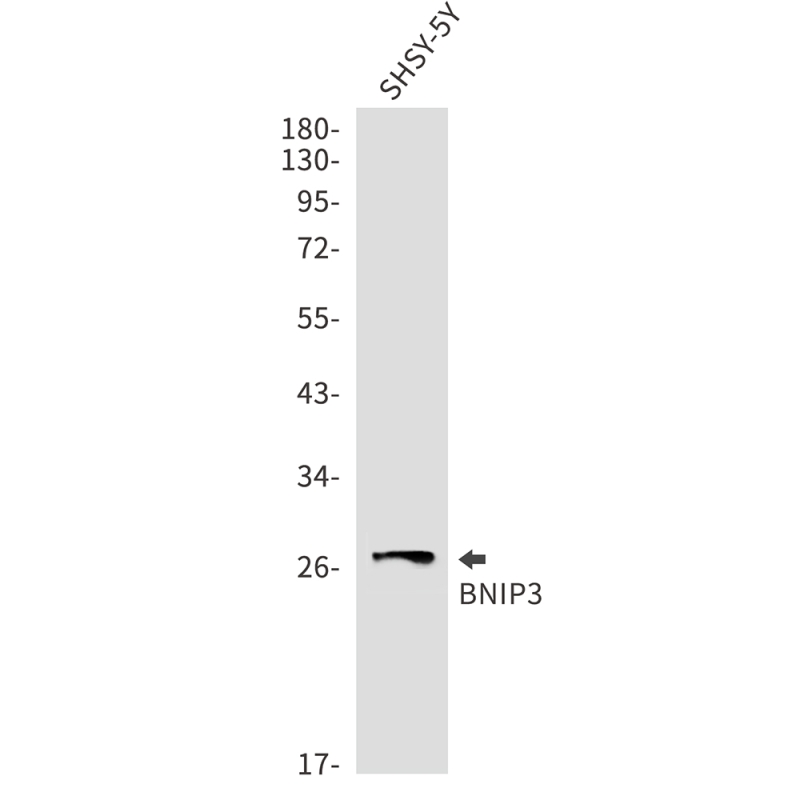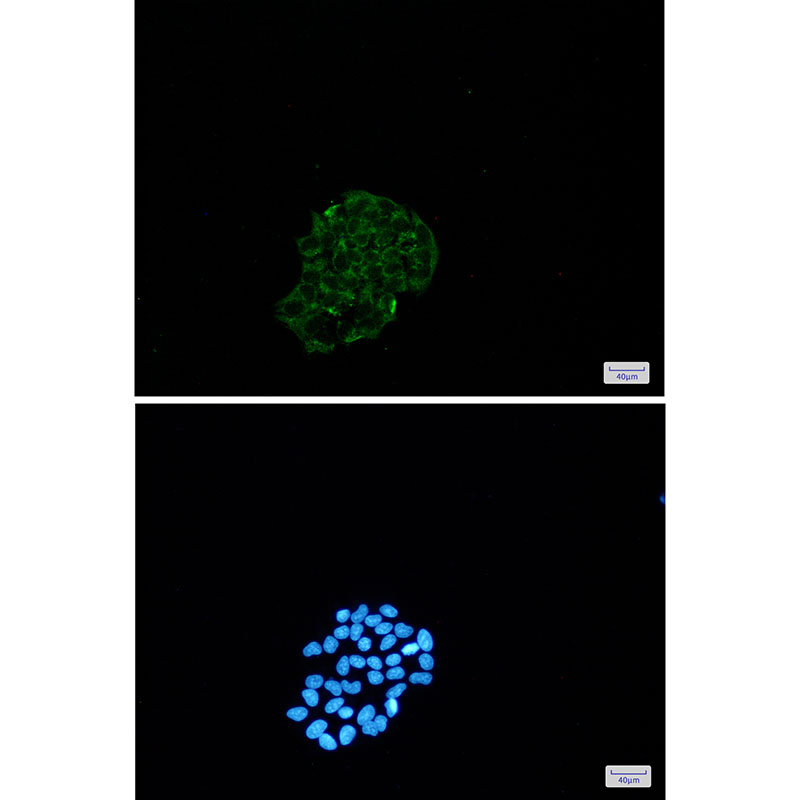


| WB | 1/500-1/1000 | Human,Mouse,Rat |
| IF | 1/50-1/200 | Human,Mouse,Rat |
| IHC | 咨询技术 | Human,Mouse,Rat |
| ICC | 1/50-1/200 | Human,Mouse,Rat |
| FCM | 咨询技术 | Human,Mouse,Rat |
| Elisa | 咨询技术 | Human,Mouse,Rat |
| Aliases | BNIP3; NIP3 |
| Entrez GeneID | 664 |
| WB Predicted band size | Calculated MW: 22 kDa; Observed MW: 28 kDa |
| Host/Isotype | Rabbit IgG |
| Antibody Type | Primary antibody |
| Storage | Store at 4°C short term. Aliquot and store at -20°C long term. Avoid freeze/thaw cycles. |
| Species Reactivity | Human,Rat |
| Immunogen | A synthetic peptide of human BNIP3 |
| Formulation | Purified antibody in TBS with 0.05% sodium azide,0.05%BSA and 50% glycerol. |
+ +
以下是关于BNIP3抗体的3篇参考文献示例(内容基于领域内典型研究方向,具体作者与年份可能存在调整,建议通过数据库核实):
---
1. **文献名称**:*BNIP3 Antibody Characterization in Hypoxia-Induced Autophagy*
**作者**:Zhang, H. et al.
**摘要**:该研究利用特异性BNIP3抗体,通过Western blot和免疫荧光技术,证实了缺氧条件下BNIP3在细胞线粒体膜上的表达上调,并参与调控线粒体自噬过程,揭示了其与细胞能量代谢的关系。
2. **文献名称**:*Development of a Monoclonal Antibody for BNIP3 Detection in Tumor Tissues*
**作者**:Yasuda, M. et al.
**摘要**:研究团队开发了一种高特异性的BNIP3单克隆抗体,并通过免疫组化分析乳腺癌组织样本,发现BNIP3低表达与患者不良预后显著相关,提示其作为潜在肿瘤标志物的价值。
3. **文献名称**:*BNIP3-Mediated Apoptosis in Ischemic Heart Disease: Antibody-Based Analysis*
**作者**:Chen, Q. et al.
**摘要**:利用BNIP3抗体研究心肌缺血模型,发现BNIP3通过促进线粒体途径凋亡加重心肌损伤,抑制其活性可缓解病理进程,为心血管疾病治疗提供新靶点。
---
**提示**:建议通过PubMed或Google Scholar检索“BNIP3 antibody”+具体研究主题(如“autophagy”“cancer”“antibody validation”)获取最新文献。关注《Cell Death & Disease》《Cancer Research》等期刊可能涉及相关研究。
BNIP3 (BCL2/adenovirus E1B 19 kDa protein-interacting protein 3) is a pro-apoptotic mitochondrial protein belonging to the Bcl-2 family, characterized by a BH3 domain. Unlike classical Bcl-2 members, BNIP3 primarily regulates cellular stress responses, including mitophagy (selective mitochondrial autophagy) and apoptosis under hypoxic conditions. It interacts with LC3 to mediate mitochondrial clearance and maintains cellular homeostasis during oxygen deprivation, making it critical in pathologies like cancer, neurodegeneration, and ischemia-reperfusion injury. BNIP3 expression is often upregulated in hypoxic tumor environments, correlating with poor prognosis and therapeutic resistance.
BNIP3 antibodies are essential tools for detecting BNIP3 protein levels, localization, and activity in research. They are widely used in techniques like Western blotting, immunohistochemistry (IHC), and immunofluorescence (IF) to study BNIP3's role in disease mechanisms. Commercially available antibodies include monoclonal and polyclonal variants, often validated for specificity using knockout controls or siRNA. Researchers rely on these antibodies to explore BNIP3's dual role in cell survival/death, its interaction with autophagy regulators, and its potential as a biomarker or therapeutic target. Validation steps, such as confirming expected molecular weight (~60 kDa) or hypoxic induction, ensure antibody reliability. Dysregulation of BNIP3-linked pathways highlights its relevance in metabolic and degenerative disorders, driving sustained interest in antibody development for preclinical studies.
×